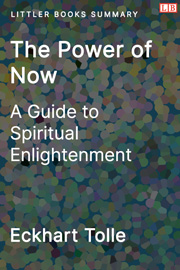Book Description
A transformative guidebook that teaches readers how to live in the present moment, find inner peace, and achieve spiritual enlightenment.
If You Just Remember One Thing
The past and future only exist in the context of the present, and dwelling on them create... More
Bullet Point Summary and Quotes
- The first step to find inner peace and improve our lives is simple -- focus on the present.
- The past is just the sum of moments that were once present, and the future is made of present moments that will happen. The feelings you have about the past and the future are still happening in the present. Life is just a series of present moments.
- The present is all you have. There is no advantage in dwelling in the past or worrying about the future. If you focus on the present, all your problems will appear smaller and more manageable so that you can handle them incrementally.
- If you're working on a big research paper, you'll do yourself a disservice if you lament on the past opportunities that you could've spent working, or panic about how much more you'll still have to do. However, if you focus on a small task that you can do right now (develop a plan, write one sentence, read an article, etc.) then you'll be more productive and also feel less stressful.
- Pain forms when we are unsatisfied with our current situation and feel powerless to change it.
- Pain is mostly self-imposed. While it might seem like pain is created by external factors, it is really our responses to external factors that create pain.
- There's a part of ourselves that needs us to feel pain in order to survive, that part is called the "pain-body". The pain-body reinforces itself whenever we experience pain, so that it eventually becomes a part of our identity, and therefore makes it hard to disassociate from certain pain.
- When someone frustrates you and it makes you angry, that is the pain-body at work. The next time he frustrates you, you'll feel angry even quicker. This response hinders your ability to think rationally and will bring more pain. Keeping the pain-body in mind will make your life less painful.
- Your ego sabotages your happiness and acts against your self-interest. It is what makes people stay in destructive relationships. It is what makes people have arguments over petty things. Let go of your ego and you'll behave more rationally and have less suffering.
- The mind is the source of suffering. It makes us agonize over the past and stress about the future. Since we can't change the past or predict the future, this suffering is useless.
- To avoid needless suffering, you need to shift the focus from your mind to your body. Your body knows what you truly need. Listening to your body allows you to better live in the present. If you feel the impulse to exercise while you're working, then you should get up and go for a walk or jog.
- Since the mind causes pain, it is helpful to know how to detach yourself from it. You can do so by becoming fully aware of your thoughts.
- If you continuously ask yourself what your next thoughts are going to be, then you'll discover that you have interrupted your flow of thoughts, and thus separated yourself from your mind.
- Another way to be separate from your mind is to accept thoughts without judgment. For example, if you are exercising instead of working and you feel guilty about it, become conscious of this thought ("Ok, this is the thought I'm having") and happily accept it without deciding if this is good or bad. This technique will help you become aware of your mind without it leading you astray.
- Active waiting is another method to help you focus on the now. Active waiting is being permanently alert as if at any moment something important will happen. This forces you to not dwell on the past or the future.
- When you're taking an exam, you might start thinking about how you didn't prepare enough or worry about the results. If you practice active waiting before and during the exam, you will shut out those thoughts and be able to focus on the present questions.
- Living in the now can be beneficial to your relationships even if your partner has an ego and does not practice present-living. Your partner might insult you, bring up the past, or incite trivial arguments to feed the ego, but the non-judgmental and accepting qualities you gain from living in the present can stop the endless cycle of clashes.
- Being present does not mean you can escape all pain. Some pain is unavoidable, but you should not suppress the pain. Instead, accept it. For example, when you lose a loved one, you will mourn, grief, and feel pain. However, if you accept it as something that just is and cannot be changed, you can avoid needless suffering.
- Do not feel guilty about having negative feelings, it is natural. Accepting them means you realize things are the way they are, and wishing they were different is a waste of time.
- Living in the present does not mean living a passive life and not looking to improve one's situation. It means avoiding creating unnecessary problems, and making finding manageable solutions to the moment's problems easier.
The Power of Now: Resources
- Download this summary and 173+ other top nonfiction book summaries in one book (PDF, eBook, DOCX)
- Buy the book
